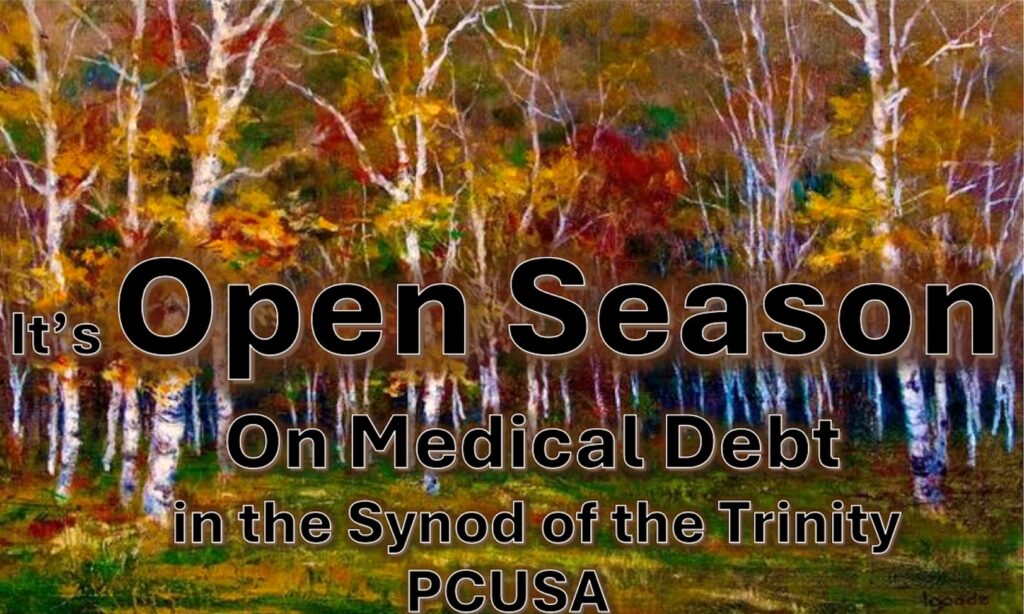You have just been involved in an accident. Maybe it was a fender-bender or a mishap at work that requires a trip to the local urgent care facility or hospital. You’ll return home and resume your normal activities soon, but the scar left behind will be a permanent reminder of what occurred this day. There could be something else that lingers for years and years that will leave a lasting memory of what transpired as well.
The ensuing medical bills from the physician’s care, their staff and the equipment that was used could be too much to overcome for some. As the debt grows, it can turn into something that will affect the lifestyle of the patient for the foreseeable future.
“All you have to do is go to the wrong hospital,” explained Jean Miewald of the impact of medical debt. “It’s not like people who have medical debt don’t have insurance. I think a lot of them do. I think it’s a problem everywhere.”
Helping to erase medical debt in the Synod of the Trinity region has become the focus of the Mission Committee at Bower Hill Community Church in Mt. Lebanon, PA, of which Jean is the chair. Earlier this year, the Pittsburgh Presbytery congregation accepted the Presbyterian Church (U.S.A.)’s Matthew 25 invitation, which asks those who join to work toward one of the following: building congregational vitality, dismantling structural racism or eradicating systemic poverty. The Mission Committee at Bower Hill has chosen the latter as its Matthew 25 initiative.
“Medical debt is one of the big reasons for homelessness,” Jean explained. “People go bankrupt, and they lose their house because of medical debt. Some people are being denied care because they already owe the hospital so much money.”
Thinking about how her church could answer the Matthew 25 challenge, Jean read about a congregation in Winston-Salem, N.C., that had eliminated a large amount of medical debt without raising that much money. Believing that helping those in her community and presbytery wasn’t enough, Jean broadened the landscape of Bower Hill’s program to include the entire Synod of the Trinity region, an idea that was quickly accepted by the church session as well as the Synod.
“We’re really interested in racism, too, but that’s a more political issue,” Jean explained. “There’s a lot of intersectionality between poverty and racism, so we thought we’d go at it through that portal instead of directly into racism.”
Bower Hill’s Mission Committee is partnering with RIP Medical Debt to begin eliminating these bills. RIP Medical Debt is a four-star, 100-percent Charity Navigator non-profit organization that buys portfolios of medical debt. For instance, if someone owes a hospital $20,000 and can’t afford to pay it, the hospital will be happy to simply get some return for its services knowing it will never have the bill paid in full. RIP Medical Debt will buy that debt portfolio for a reduced price, and the debt will be wiped clean.
“There’s a market out there for debt,” Jean said. “These professional debt buyers will go out and buy these portfolios of debt and then try to make their money back. They buy it for pennies on the dollar with their hope that they can recoup some of it and make a profit. Instead of asking the people who owe it, RIP Medical Debt asks people like us to make a donation to buy it back.”
The focus for RIP Medical Debt is on people who are within 4 times of the poverty rate. Jean added that Medicaid will assist those who are at the lowest end of the poverty level, creating a “donut hole” area between 2-4 times the poverty rate for people who make too much to be on Medicaid but still don’t make enough to pay off their medical debt.
Add in that fact that there’s been a recent change in Medicaid benefits and it’s throwing another wrench into people’s abilities to pay their medical bills.
“The supplements from the federal government for Medicaid have gone away,” Jean said. “There’s about 180,000 people in Pennsylvania who have lost their Medicaid in the last month, and 102,000 of those are because they’re no longer eligible. These are the kind of folks who are going to be probably needing help with their medical debt.”
The City of Pittsburgh recently used a similar buy-back tactic to reduce medical debt in its area, pulling $1 million of covid relief funds to put toward its campaign. Bower Hill’s plan is similar, with the help of those in the greater region.
“What we want is for every member of the Synod of the Trinity to donate at least $5,” Jean said. “There’s 120,000 people in the Synod of the Trinity, and our goal is $500,000. There are some people who aren’t going to give and there’s some people who are going to give more. We spend $5 at Starbucks without even giving it a second thought. You can change that $5 into almost $500 of medical debt relief.”
Jean was told by her contact at RIP Medical Debt that $355,000 raised would erase $20 million in medical debt. As of late September, more than $1,200 has been raised for this initiative. (To donate, click on the blue “Donate Now” button below.)
Medical debt is a situation that needs addressing and one that Jean and the Bower Hill Church Mission Committee are standing up and taking action against.
“If your kid falls and breaks their leg, you’re going to take them to the hospital,” Jean said. “People are in medical debt through no fault of their own as opposed to some of the other reasons people get in debt – what we consider the poor choices that they make. This isn’t one of those.
“It’s a big problem, and you get such a huge return on your investment.”


